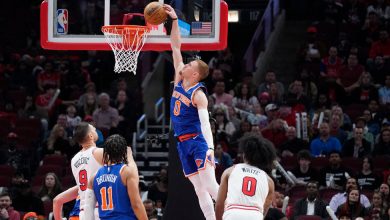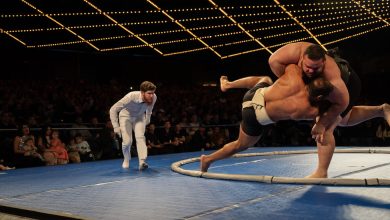The Elusive Truth Behind the Attack on a French Soccer Star

VERSAILLES, France — It was dark by the time Aminata Diallo stepped through the concrete arch of the Hôtel de Police and onto the sidewalk outside. It had been about 36 hours since officers had banged on her apartment door, rousing her from sleep and taking her into custody.
Now released and scrolling through the hundreds of messages she had missed, Diallo, a midfielder for the French soccer team Paris St.-Germain, was stunned by what she saw. Little known only days earlier beyond the cloistered world of French women’s soccer, her name was suddenly headline news around the world.
Diallo, the news reports said, was the player who had been driving the car last month when one of her teammates was pulled from the passenger seat by a masked man and assaulted. Diallo, the reports said, was the one who had been unharmed as her friend and teammate Kheira Hamraoui was beaten with an iron bar. And Diallo was the player now being questioned not as a witness but as a possible suspect in what the police had suggested was an orchestrated attack.
The story, with its hints of sporting jealousy, its echoes of Tonya Harding and its links to Paris St.-Germain, the reigning French champion and one of the richest soccer clubs in the world, quickly spread far and wide.
But as details emerge — about marital infidelity; about accusations implicating other members of the team; about reports of menacing phone calls to players disparaging the victim before she was attacked — that initial story has been turned on its head.
And now no one is sure what, or whom, to believe.
A Case in Limbo
More than three weeks have passed since Diallo, 26, walked out of the police station in Versailles, released after two days of interviews and a night in a tiny, foul-smelling cell. The investigation continues, but the police appear to be no closer to figuring out what, or who, was behind the attack on Nov. 4 on a dark street in the Paris suburb of Chatou.
A few things are undisputed. Hamraoui, 31, was the victim of a serious crime. Diallo was questioned and released. None of the attackers have been identified. No weapon has been recovered. And no one has been charged with a crime.
But in reporting about the tumultuous weeks since the attack, The New York Times also learned that Hamraoui has at times suggested other people with links to the club, including at least two other teammates, may have been involved in her assault; that while P.S.G. kept Diallo and Hamraoui training apart from the team, and from each other, for weeks, a scheduling mistake led to one interaction in which sharp words were exchanged; and that while the police released Diallo without filing charges, they have declined to clear her of suspicion and have retained her two cellphones and laptop.
The collateral damage of the incident, meanwhile, continues to grow. Diallo and Hamraoui had their names smeared and their careers disrupted. The locker room harmony at P.S.G. has been shattered, hobbling the trophy ambitions of one of Europe’s best teams. And the marriage of a French soccer hero drawn into the case has collapsed; his wife released a statement saying she would seek a divorce after, her lawyer claimed, he had admitted to her that he had been having an extramarital affair with Hamraoui.
The Times collected information on the attack, and its aftermath, by interviewing nearly a dozen people with direct knowledge of the principals, the assault and the days that followed, including friends, relatives and associates of the players; the players’ lawyers; P.S.G. insiders; and the police.
Many of those interviewed sought to rebut the story’s existing narrative of jealousy and betrayal, and nearly all agreed to speak only if they were not quoted by name, given the sensitivity of the case.
Yet the path forward appears as complicated as the present: Hamraoui met with the police again last week, and Diallo most likely faces further questioning, too. The players are set to rejoin their teammates in training on Tuesday, but the case is now in the hands of an investigating magistrate, a process that could continue for at least 18 months. During that time, the authorities, and the players, will continue to try to untangle the single minute on a dark street that changed both of their lives.
A Team Dinner
To those present there was nothing special about the dinner at an upscale restaurant set on an island in one of Paris’s biggest parks in the first week of November.
The players had been brought together by their club to break bread, an effort to maintain the cohesion that helped them start the season undefeated, and to steel them for the challenges ahead.
Diallo agreed to pick up Hamraoui and another player, Sakina Karchaoui, after the club asked the players to car pool because of limited parking at the restaurant. The three players, who lived near one another in the northwest suburbs of Paris, had grown close since joining the club over the summer: Hamraoui from Barcelona, Karchaoui from Lyon and Diallo from a brief loan at Atlético Madrid. But Diallo and Hamraoui, teammates from a previous stint at P.S.G. and camps with France’s national team, were particularly friendly; they had even vacationed together.
After dinner, around 10:30 p.m., the three women returned to Diallo’s car, a club-issued Toyota Corolla, for the drive home. Hamraoui jumped into the front passenger seat, Diallo plugged Karchaoui’s address into a navigation app, and they set off.
After dropping off Karchaoui, and with parked cars narrowing the roadway, Diallo was still pulling away tentatively when two men, their faces covered by masks, emerged from behind a van. They thumped on the car’s hood, demanding that it stop, and screamed to Diallo and Hamraoui to “open the door.”
The assailants moved quickly. One opened the driver’s door and pinned Diallo against the steering wheel. The other yanked Hamraoui from the passenger seat.
“The man on my side grabbed me and pulled me from the vehicle,” Hamraoui later told the police, according to details of her statements published by the French news media. “Before he did that, he pulled a rectangular iron bar that he had hidden in his pants or underneath his sweater. He hit me from the very first moments of the attack to force me out.”
Hamraoui said she fell into the road. “My attacker hit me with an iron bar several times,” she said. “I saw that he was targeting my legs, and I tried to protect myself with my hands.”
Hamraoui said she recalled hearing one of the men yell something about a married man. Diallo would later tell the police she heard a full sentence: “So like that, you touch married men?” Diallo also told the police that she had heard sexually charged insults above the agonizing screams of Hamraoui as the attacker’s blows rained down.
The attack lasted less than a minute before the assailants fled. Hamraoui, blood streaming from a wound on her hand, slumped back into the car. She and Diallo immediately called Karchaoui, whose home was less than 100 meters behind them, to tell her what had happened and to ask her to join them at the car. Then they set off for a nearby emergency room.
The Aftermath
As Diallo drove, the players alerted their team. P.S.G.’s deputy head of security, Frédéric Doué arrived at the hospital with Bernard Mendy, an assistant coach on the women’s team. A friend of Hamraoui’s soon appeared there as well.
With Hamraoui’s wounds treated but the assailants unidentified, the club officials told the women that under no circumstances were they to return to their homes. Instead, the team arranged for them to spend the night at a Holiday Inn close to the team’s training base about 10 miles west of central Paris.
The hotel was familiar to all three women; they had spent weeks there after their moves to P.S.G. last summer. Karchaoui and Hamraoui shared a room. Diallo took one nearby. Hamraoui’s friend also spent the night.
In the hotel, the women discussed who might have been behind the attack. Hamraoui was adamant from the start that someone at the club was involved, according to people familiar with the conversations. The players also discussed a strange episode from a couple of weeks earlier, when a number of their teammates had received anonymous calls from a man speaking ill of Hamraoui. But as they continued to talk through the night, Hamraoui also alighted on other potential suspects, at one point raising the name of the husband of a fourth P.S.G. teammate, who acts as the agent for yet another French star on the team.
The next morning, after a few hours of fitful, fretful sleep, the women went through the events again. As they talked, Hamraoui received a phone call. It was Eric Abidal, a former French national team player whom she had come to know at Barcelona, where she played for three seasons when he served as the club’s technical director.
Hamraoui asked Abidal if his wife might want to hurt her, before telling him that she had been assaulted. With the phone set to loudspeaker, the people in the room could hear his response: He sounded stunned. A few more words were exchanged and the call ended.
Karchaoui and Diallo soon left together to have breakfast at the club’s training facility in Bougival, where they practiced before meeting with members of the club’s management to relay the details of the attack. (Hamraoui did not accompany them; she was taken for more treatment of her injuries.) Later, the players and several teammates, those who received the anonymous calls, went to the police station to provide more statements.
The club, uneasy about an attack on one of its players, assigned members of its security staff to watch over the homes of Diallo, Hamraoui and Karchaoui in the days that followed, but news of the assault stayed within the club.
Inside the team, though, tensions were mounting. The French national team striker Kadidiatou Diani, angry that Hamraoui had mentioned her husband as a possible suspect — he has not been implicated or even questioned by the police — confronted her teammate as Hamraoui worked out on a bicycle.
On Nov. 9, less than a week after the attack, Diallo started in Hamraoui’s place in a Champions League game against Real Madrid. Karchaoui played, too. Nothing seemed amiss, beyond Hamraoui’s absence, which was explained away by the club as being for “personal reasons.” P.S.G. collected another victory. It had still not allowed a goal all season.
That night, as she does after most games, Diallo stayed up late, the adrenaline of having played keeping her up until about 3 a.m. She had barely slept, according to people close to her, when a few hours later she was awakened by banging at her front door. Opening it, she was confronted by four police officers.
36 Hours
Politely but firmly, an officer told Diallo that she was to accompany them to the police station. Other officers searched her home and collected items, including at least two cellphones and a laptop computer. At the police station, Diallo declined an offer to have a lawyer present during questioning.
From the moment the police started asking her questions, Diallo realized Hamraoui had named her as a suspect. The police suggested Diallo had taken a different route home after dinner than the one she had first suggested. They questioned her about why she had been driving so slowly after she pulled away from Karchaoui’s home. And then they presented her with the theory, later published by a French newspaper while she was still in custody, that the assault might have been rooted in her desire to acquire Hamraoui’s midfield spot in the first team.
It was that claim that vaulted the story into the global news cycle, and prompted the comparisons with the infamous 1994 assault on the figure skater Nancy Kerrigan.
The police concentrated on the same series of questions during repeated rounds of questioning with Diallo, mainly focusing on the car journey and her actions during the assault. But they also asked her about her connection to a man imprisoned in Lyon for unrelated crimes, including extortion. The man, known as Ja Ja, was familiar to several female soccer players, Diallo told the police, including Hamraoui. He, too, was being questioned about the attack, the police later confirmed.
And after at first keeping it to herself, Diallo revealed to her questioners that she had heard one of the assailants accuse Hamraoui of sleeping with a married man. (By the end of her fifth interview, the police had learned that the chip in Hamraoui’s cellphone was registered in Abidal’s name; Hamraoui had told them only that it was linked to an ex-boyfriend.)
By then, Diallo told friends, she had noticed a softening in the police’s questioning. Still, they said she would have to spend the night in her cell because the next day she would be required to participate in a “confrontation” with Hamraoui — a feature in French criminal investigations in which suspects and witnesses are presented with versions of events at the same time and allowed to respond.
To make her stay more comfortable, the police allowed Diallo, a Muslim, to order her own dinner through a food delivery app. She chose a halal chicken sandwich.
A Murky Future
It was late in the afternoon the next day when Diallo finally came face to face with Hamraoui. She later told friends and relatives that she found it “bizarre” to hear the accusation being leveled at her: that Hamraoui had heard from other teammates that Diallo was behind the attack. Diallo denied the charge. The meeting lasted about an hour. When it ended, Diallo was allowed to leave.
At the entrance to the police station, she was picked up by a friend. As she was driven home, the scale of her unwanted celebrity quickly became clear in the hundreds of text messages she had received from friends and family and others.
That evening she hired a lawyer, Mourad Battikh, to represent her. The next day, P.S.G.’s general manager, Ulrich Ramé, accompanied by a doctor, met with Diallo at her home. They urged her to spend time with her family, to recover. Diallo insisted she was ready to return to training, that all she wanted to do was play again. The team quickly made it clear that would not be possible initially.
With a break in P.S.G.’s schedule, Diallo eventually made a trip to Grenoble to visit her family, parts of which had learned of the attack, and her arrest, through news media reports.
A cousin, Abou Dieng, told The Times that all Diallo wanted to do was return to the field for P.S.G., the team she had always dreamed of representing. “We don’t even speak about Hamraoui,” he said. “We speak just about football and a return to the training ground.”
After returning to Paris, Diallo trained alone. So did Hamraoui, with the club scheduling their workouts at different times and taking pains to ensure sure they were never at the training facility at the same time (not always successfully). Their purgatory began to end on Monday, when they trained together for the first time since the attack after France’s players’ union intervened. They were to rejoin their teammates on Tuesday, but a club official said both would be held back from a midweek trip to Ukraine for a Champions League game.
Neither Diallo nor Hamraoui has said anything publicly about the attack or its aftermath. But a few days after Diallo’s release from detention, Battikh appeared on French television and described his client’s arrest as “defamatory, scandalous and incoherent.” A few hours later, Hamraoui’s lawyer, Said Harir, took to the airwaves brandishing images that showed in graphic detail the injuries his client had sustained.
P.S.G., which declined to comment for this article, has said little amid twisting plotlines in the case, which now appear to include the demise of Abidal’s marriage. A lawyer representing his wife, Hayet, said she had filed for divorce, and released a statement on Nov. 18 in which Hayet Abidal claimed her husband had admitted to an extramarital affair with Hamraoui. Eric Abidal later took to Instagram to plead with his wife for forgiveness.
Hayet Abidal has denied any involvement in the attack. But Maryvonne Caillebotte, the prosecutor first responsible for the case, told Le Monde last month that Abidal “would be heard soon” and did not exclude the possibility that his wife would be questioned, too.
Battikh, Diallo’s lawyer, remains furious at how Diallo was treated by the police. “When it’s Aminata they show their muscles and they place her in detention,” Battikh said. “When it’s Eric Abidal — someone strong, famous, popular — they take their time, go slowly, ensure they don’t make a mistake.”
The P.S.G. women’s team remains convulsed by the crisis. A few of Hamraoui’s teammates have asked to move their lockers away from hers in the dressing room. Others have told club management that they will find it hard to play with her again. Several of the club’s best players just want to move on.
All the while, the assailants remain at large, and no one can say where the case may lead. A premeditated attack like the one inflicted on Hamraoui carries a five-year prison sentence, according to a police spokeswoman in Versailles.
Diallo wants justice, her lawyer said. She is convinced of her innocence and determined to continue her career at P.S.G., where she has only six months left on her contract. “Her reputation was damaged by all the newspapers around the world,” said Battikh, her lawyer.
Hamraoui wants justice, too, and continues to believe the truth will be found inside her soccer club. She said as much in her most recent interview with the police on Nov. 29; the investigators, according to a person familiar with her appearance, asked her again about Diallo’s actions on the drive home, and the route she took.
In his office in an upscale district close to the Champs-Élysées, Hamraoui’s lawyer, Harir, said the focus must remain on finding out who was behind the attack. “We expect they will charge the guilty people quickly,” he said.
“What she wants today,” he added of Hamraoui, “is that her private life is respected, that her status as a victim is respected.”
Romain Molina contributed reporting.




